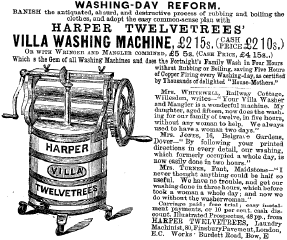
|
A century ago, running a house and preparing the meals were full-time, skilled occupations requiring considerable knowledge. And the labour-saving devices, like the Villa Washing Machine advertised in the Tasty Dishes Cookbook of 1883, were primitive - and all hand-powered. We might consider this washing machine a monstrosity - little more than an ugly barrel on wheels topped with a mangle - but Mrs Whitelaw, of Railway Cottage, Willesden, was ecstatic. "Your Villa Washer and Mangle is a wonderful machine", she wrote. "My daughter, aged fifteen, now does the washing for our family of twelve, in five hours, without any woman to help." Even the language and style of a cookbook reflects its society. In our politically correct age, cookbooks make no assumptions about the gender of the cook or housekeeper. Nor do they include moral or religious homilies. Mrs Beeton, however, wrote her books specifically for "the mistress of the house". She dwelt on the "qualities and virtues" necessary for "proper" household management, and commented on the choice of friends, on "Good Temper" and on "Engaging Domestics". And she quoted, approvingly, the Rev. Dr. Primrose, Goldsworthy's fictional Vicar of Wakefield, who says: "....The modest virgin, the prudent wife, and the careful matron are much more serviceable in life than philosophers, blustering heroines, or virago queans." Clearly, the world in which Mrs Beeton lived was very different to our own. But it was changing fast. By 1900, the Book of Household Management included sections on European and American housekeeping, as well as comments on domestic life in Australia. Wages for a female servant, we are told, are "quite doubled when they emigrate" to Australia. And "a good cook can easily earn from £40 to £50 a year". Cookery and provisions in Australia are "much the same as in England", except that items such as rice, tea, coffee, rum, beer and wine "cease to be luxuries" because the "Colonists" grow and make their own. And Australian wines, even then, were singled out as being "excellent, particularly the red ones." But it is noted that "up country" really good servants" are hard to find and the Australian housewife ("no matter what rank she belongs to") needs to be self sufficient. By 1915, wartime economies meant that even English housewives needed to be self-sufficient. Advertisements in the Tried Favourites Cookery Book refer to "Men in Khaki...and Men in Blue". And economies have become essential. One business exhorts "Ladies and Gentlemen" not to buy new clothes for fear of "taking the yarns that ought to have gone to make some soldier's suit." "BE PATRIOTIC", says the bold type, and it is followed by a price-list for cleaning, pressing and repairing various items of clothes. Economy was even more the theme in 1931, when Up-to-Date and Economical Cookery was published in London. Housewives were exhorted to "do your own shopping", because "You seldom get such good articles if you order, or the exact weight." And although the introduction to The Goulburn Cookery Book of 1934 mentions "teaching inexperienced maids", the advertisers aim squarely at the servantless mother who "skimps" her own breakfast whilst "seeing father is served" and "getting the kiddies away to school". |


